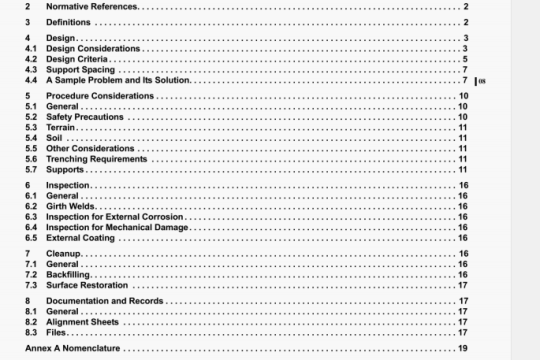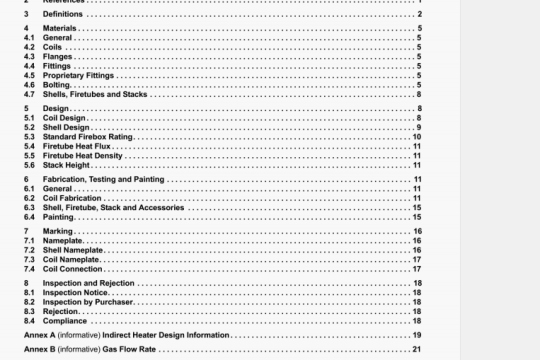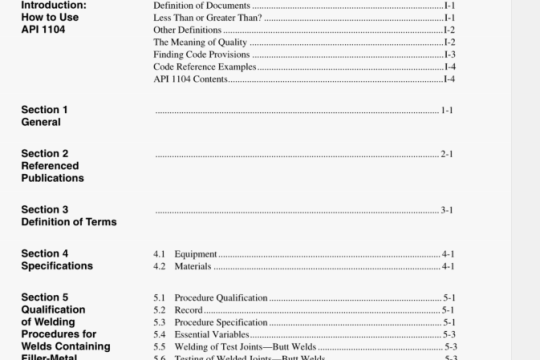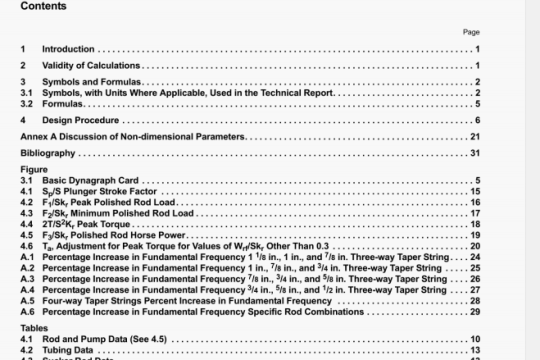API S1:2001 pdf download
API S1:2001 pdf download.Organization and Procedures for Standardization of Oilfield Equipment and Materials.
3. GENERAL POLICIES
Principles
The “Principles for Standards Activities” defined in API Policy 104 (Appendix C) shall apply in all API Upstream Segment standards activities.
Standards should be written in clear and unambiguous language, and specification requirements should be specific and surveyable.
Standards should be written in a manner that minimizes need for users of the products involved to develop supplemental company standards or exceptions. Layered levels of specification requirements should be considered when standardizing products for which different applications or environments require significantly different levels of performance capabilities.
3.2 Legal Considerations
3.2.1 Limitations of API Standards and API Responsibility
API standards are only intended to satisfy the principles of the program as stated in Section 3.1. The American Petroleum Institute makes no representation, warranty or guarantee and specifically denies any liability or responsibility for loss or damage resulting from using API standards or products made to API standards, To assure communication of these limitations each API standard shall include appropriate policy statements approved by the API Office of General Counsel.
3.2.2 Antitrust Laws
It is the policy of the API to strictly comply with the antitrust Jaws. It is the responsibility of every committee member, officer and employee of the API to comply with the antitrust regulations. An Antitrust Compliance Guide has been developed by the API Office of General Counsel, and can be obtained from the API Upstream Segment to assist in identifying situations which may have antitrust implications.
The development of standards is recognized as an important and legitimate function of trade associations, however, care must be exercised in the manner in which standards are formulated. Following are some important, but not all-inclusive, examples of antitrust compliance precautions:
• AH interested parties, whether or not they are members of a trade association, should have the right to comment on proposed standards that affect their business.
• All comments and suggestions received should be given serious consideration.
• Regardless of which standards are adopted, there should be no agreement to adhere to association standards. Each company should be free to decide whether or not to accept a standard.
• The standards should not give unfair advantage to any vendor or group of vendors, should not discourage or inhibit design developments, and should not prohibit use of innovations.
3.3 National and International Standardization
API Standards and the API standardization program are recognized worldwide, and API encourages representatives of companies and organizations involved in use or manufacture of oilfield equipment in any country to actively participate in the API standardization program. It is the policy of the API to cooperate with international standardization bodies such as International Organization for Standardization (ISO). This requires adequate representation by users, manufacturers, and API staff, and close coordination of related APi and iSO efforts (see Section
5.3). Additionally, API is a member of the American National Standards Institute (ANSI) which coordinates the adoption of American National Standards and is the United States’ member of ISO. APL standards are processed through ANSI for adoption whenever practical.
3.4 Metrication
in recognition of increasing worldwide acceptance of the metric (Si) system, and Federal legislation initiating domestic use of that system, API will support a coordinated and orderly conversion and will encourage national standardization efforts that are also compatible with such efforts worldwide.
4. COMMIT1EE ORGANIZATiON
4.1 General Organization
Figure 1 illustrates the typical organization of API Upstream standardization committees. In this API Upstream standardization program, committee (see Section 4.4) denotes a unit directly below the Executive Committee, subcommittee (see Section 4.5) denotes a unit directly under and stemming from a committee, and task group (see Section 4.6), resource group or advisory group (see Section 4.6. 1.4) denote a unit directly under a committee or subcommittee. Task groups typically are temporary units with specific assignments and time lines, but may be formed as resource or advisory groups to act in an advisory capacity in a particular subject area (see Paragraph 4.6.1.4). Task groups having substantial assignments may temporarily appoint small groups of their member as work groups (see Paragraph 4.7) to address parts of the assignment.




